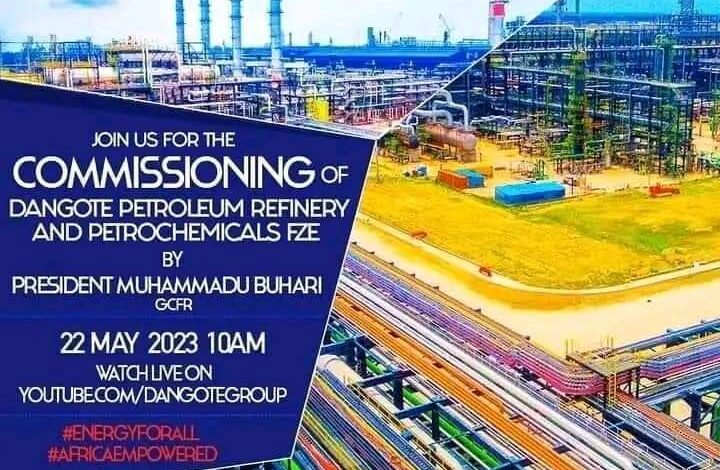The Game-Changer: How Dangote Refinery Is Revolutionizing Nigerian Energy
the most largest refinery in the world

The Game-Changer: How Dangote Refinery Is Revolutionizing Nigerian Energy
Dangote Refinery, located in Lagos, Nigeria, is one of the most ambitious and technologically advanced refinery projects in Africa. Led by Aliko Dangote, one of Africa’s wealthiest individuals, the refinery aims to address Nigeria’s significant dependence on imported petroleum products and revolutionize the country’s oil industry. Let’s take a closer look at the cutting-edge technology employed by Dangote Refinery.
- Single-Train Refinery Design: Dangote Refinery utilizes a single-train design, which allows for greater operational efficiency and flexibility. The refinery has a refining capacity of 650,000 barrels per day (bpd), making it the largest single-train refinery in the world.
- Crude Distillation Units (CDUs): The refinery consists of several CDUs that separate crude oil into various petroleum fractions based on their boiling points. These CDUs employ advanced technology to efficiently separate the crude oil into gasoline, diesel, jet fuel, and other valuable products.
- Fluid Catalytic Cracking (FCC) Units: The FCC units at Dangote Refinery play a crucial role in converting heavy hydrocarbons into lighter and more valuable products. This process utilizes a catalyst to break down complex hydrocarbon molecules, enhancing the production of gasoline, diesel, and other high-demand products.
- Residue Fluid Catalytic Cracking (RFCC) Units: The RFCC units are specifically designed to convert the bottom-of-the-barrel residues, which are heavy and contain impurities, into lighter and more valuable products. This technology maximizes the utilization of crude oil and minimizes waste.
- Hydrocracking Units: Dangote Refinery employs hydrocracking units to further upgrade heavy hydrocarbon streams into lighter and higher-value products. Hydrocracking involves the use of hydrogen and a catalyst to break down complex molecules, resulting in increased production of diesel and other high-quality fuels.
- Continuous Catalyst Regeneration (CCR) Platforming: The refinery incorporates the CCR Platforming technology, which enables the production of high-octane gasoline blending components. This process maximizes the production of valuable products while minimizing environmental impact.
- Advanced Control Systems: Dangote Refinery integrates advanced control systems and automation technologies to optimize the overall refinery operations. These systems monitor and regulate various processes in real-time, ensuring efficient and safe operations.
- Renewable Energy Integration: In line with its commitment to sustainability, Dangote Refinery incorporates renewable energy sources, such as solar power, to supplement its energy requirements. This integration of renewable energy helps reduce the refinery’s carbon footprint and reliance on fossil fuels.
- Effluent Treatment: The refinery places a strong emphasis on environmental sustainability. It incorporates advanced effluent treatment systems to ensure that wastewater generated during the refining process is treated and managed properly, meeting stringent environmental standards.
- Quality Assurance: Dangote Refinery has stringent quality assurance measures in place to ensure the production of high-quality petroleum products. Advanced laboratory facilities and quality control procedures are implemented to monitor and maintain product specifications.
Overall, Dangote Refinery’s cutting-edge technology and design enable efficient and sustainable refining operations. The refinery’s ambitious scale, advanced process units, and commitment to environmental sustainability position it as a significant player in Nigeria’s oil industry and contribute to the country’s energy security.
The construction of Dangote Refinery is a remarkable story of ambition, vision, and determination. Aliko Dangote, the founder and chairman of the Dangote Group, conceived the idea of building the refinery to address Nigeria’s heavy dependence on imported petroleum products and to contribute to the country’s economic development. Here’s a closer look at the journey from dream to reality:
- Vision and Planning: Aliko Dangote, recognizing the potential for Nigeria to become self-sufficient in petroleum refining, envisioned building a state-of-the-art refinery. The planning phase involved comprehensive feasibility studies, market analysis, and financial assessments to ensure the project’s viability.
- Strategic Partnerships: Dangote recognized the need for strong partnerships to bring his vision to life. The Dangote Group engaged international engineering and construction firms with extensive experience in large-scale refinery projects. Partnerships were also established with technology providers to incorporate cutting-edge refining processes.
- Funding: The construction of such a massive project required substantial financial resources. Aliko Dangote leveraged his personal wealth and secured financing from local and international banks to fund the refinery’s construction. The Dangote Group also went public on the Nigerian Stock Exchange, further raising capital for the project.
- Engineering and Construction: The Dangote Group engaged globally renowned engineering firms to design the refinery and oversee its construction. These firms brought their expertise in refinery design, process engineering, and project management to ensure the successful implementation of the project.
- Site Selection and Infrastructure Development: The refinery site, located in Lekki, Lagos, was carefully chosen due to its strategic proximity to oil supply sources and transportation infrastructure. The Dangote Group invested in developing necessary infrastructure, including roads, pipelines, and storage facilities, to support the refinery’s operations.
- Construction Milestones: The construction of Dangote Refinery proceeded in multiple phases, marked by significant milestones. The initial stages involved site preparation, foundation works, and the installation of critical infrastructure. As construction progressed, major process units, storage tanks, and utilities were erected.
- Skilled Workforce: The project required a large and skilled workforce. The Dangote Group collaborated with local training institutions and international experts to train and develop a competent workforce capable of handling the complex technology and operations involved in a modern refinery.
- Overcoming Challenges: The construction of Dangote Refinery faced various challenges, including logistical complexities, regulatory approvals, and ensuring adherence to safety and environmental standards. The Dangote Group demonstrated resilience and adaptability, working closely with stakeholders to navigate these challenges and keep the project on track.
- Local Content and Socioeconomic Impact: Dangote Refinery placed a strong emphasis on local content and socioeconomic development. The project provided employment opportunities for thousands of Nigerians, fostered skills development, and supported local businesses and industries through its supply chain.
- Future Outlook: As construction nears completion, Dangote Refinery is poised to transform Nigeria’s oil industry. It will significantly reduce the country’s dependence on imported petroleum products, create new revenue streams, and contribute to economic growth and energy security in Nigeria and the region.
The construction of Dangote Refinery represents Aliko Dangote’s determination to transform Nigeria’s petroleum industry and drive economic development. The project showcases the power of visionary leadership, strategic partnerships, and a relentless pursuit of a dream-turned-reality.
The Dangote Refinery is expected to have a significant economic impact on Nigeria and Africa as a whole. Here are some key areas where the refinery is expected to contribute:
- Reduction in Import Dependence: Nigeria currently relies heavily on imported petroleum products to meet its domestic demand. The completion of Dangote Refinery will substantially reduce the country’s import dependence and save valuable foreign exchange reserves. This will contribute to Nigeria’s overall economic stability and strengthen its balance of trade.
- Job Creation: The construction and operation of Dangote Refinery have created a substantial number of direct and indirect job opportunities. During the construction phase, the project provided employment to thousands of skilled and unskilled workers. Once operational, the refinery will require a large workforce to operate and maintain its various units, further contributing to job creation.
- Downstream Industries: The establishment of a world-class refinery like Dangote Refinery will stimulate the growth of downstream industries in Nigeria and Africa. The availability of domestically refined petroleum products will support the development of industries such as petrochemicals, plastics, and manufacturing. This, in turn, will generate additional employment opportunities and promote industrialization.
- Export Potential: Dangote Refinery has the capacity to produce a wide range of refined petroleum products, including gasoline, diesel, jet fuel, and petrochemical feedstock. The surplus production can be exported to other African countries, reducing their import reliance as well. This will not only enhance regional energy security but also open up new avenues for trade and economic cooperation.
- Government Revenue and Taxes: The operation of Dangote Refinery will contribute significantly to government revenue through taxes, royalties, and other levies. The increased economic activity associated with the refinery’s operations will generate substantial tax revenue for the government, which can be allocated towards public infrastructure, social welfare programs, and developmental initiatives.
- Technology Transfer and Skills Development: Dangote Refinery incorporates cutting-edge technology and advanced refining processes. This will facilitate the transfer of technological know-how to local workers and institutions, enhancing their skills and knowledge in the refining industry. The development of a skilled workforce will have a long-term positive impact on Nigeria’s human capital and contribute to the overall industrialization of the country.
- Energy Security: Nigeria has experienced energy shortages and intermittent fuel supply in the past due to its import dependence. The completion of Dangote Refinery will enhance Nigeria’s energy security by ensuring a steady supply of refined petroleum products. This stability in energy supply will support industrial growth, attract investments, and foster economic development.
- Regional Economic Integration: Dangote Refinery’s surplus production can help foster regional economic integration in Africa. By exporting refined petroleum products to neighboring countries, the refinery can contribute to the development of a regional energy market, facilitate trade, and strengthen economic ties between African nations.
Overall, the economic impact of Dangote Refinery on Nigeria and Africa is expected to be substantial. It will contribute to job creation, reduce import dependency, stimulate downstream industries, generate government revenue, enhance energy security, and promote regional economic integration. The refinery represents a major step towards self-sufficiency in petroleum refining and paves the way for sustainable economic growth in the region.
Dangote Refinery is poised to play a transformative role in achieving energy independence in Africa. Here’s how the refinery is paving the way for energy independence on the continent:
- Domestic Refining Capacity: Dangote Refinery, with its massive refining capacity of 650,000 barrels per day, will significantly increase Nigeria’s domestic refining capacity. Currently, Nigeria heavily relies on imported petroleum products to meet its energy needs. By refining crude oil domestically, the refinery will reduce the country’s dependence on imports and enhance energy self-sufficiency.
- Reduction in Fuel Import Costs: Nigeria, like many African countries, spends a substantial portion of its foreign exchange reserves on importing petroleum products. Dangote Refinery’s operations will lead to a significant reduction in fuel import costs, allowing the country to allocate those resources to other development priorities. This will enhance economic stability and promote sustainable growth.
- Energy Security: Dangote Refinery will enhance energy security in Nigeria and Africa by ensuring a consistent and reliable supply of refined petroleum products. With a domestic refinery of such scale, Nigeria will be better equipped to meet its energy demands, reducing the vulnerability associated with import disruptions and fluctuations in international oil prices.
- Regional Energy Integration: The surplus production from Dangote Refinery has the potential to foster regional energy integration in Africa. The refinery’s export of refined petroleum products to neighboring countries will contribute to the development of a regional energy market. This integration will enhance energy access, promote trade, and strengthen economic ties among African nations.
- Economic Diversification and Industrialization: Dangote Refinery’s operations will stimulate economic diversification and industrialization in Nigeria and the wider region. The availability of domestically refined petroleum products will support the growth of downstream industries, such as petrochemicals, plastics, and manufacturing. This, in turn, will create employment opportunities, attract investments, and contribute to sustainable economic development.
- Technology Transfer and Skills Development: The construction and operation of Dangote Refinery involve the transfer of advanced refining technology and expertise to Africa. This technology transfer will enhance the skills and knowledge of local workers, fostering the development of a skilled workforce in the energy sector. The increased technological capabilities will further support the growth of the energy industry and related sectors across the continent.
- Renewable Energy Integration: While Dangote Refinery primarily focuses on conventional oil refining, it also incorporates renewable energy sources, such as solar power, to supplement its energy requirements. This integration of renewable energy highlights a commitment to sustainable practices and sets an example for the industry. It demonstrates the potential for renewable energy adoption and paves the way for a cleaner and more sustainable energy future in Africa.
Dangote Refinery’s establishment marks a significant milestone in Africa’s journey toward energy independence. By increasing domestic refining capacity, reducing import costs, enhancing energy security, and promoting regional integration, the refinery is setting the stage for Africa to assert greater control over its energy resources and contribute to its overall economic development.
Dangote Refinery is not only putting Nigeria on the map but also elevating the country to the big leagues in the global energy industry. Here’s how the refinery is transforming Nigeria’s position and recognition on the world stage:
- Largest Single-Train Refinery: Dangote Refinery’s impressive refining capacity of 650,000 barrels per day makes it the largest single-train refinery globally. This distinction brings attention to Nigeria as a significant player in the refining sector and showcases the country’s capability to undertake and successfully execute large-scale projects.
- Technological Advancement: The cutting-edge technology and advanced refining processes employed by Dangote Refinery demonstrate Nigeria’s technological prowess and expertise in the energy industry. The refinery’s adoption of innovative technologies puts Nigeria on par with global industry standards and positions the country as a hub for technological advancements in refining.
- Energy Self-Sufficiency: Nigeria has long been dependent on imported petroleum products to meet its domestic energy needs. Dangote Refinery’s establishment is a game-changer that will reduce Nigeria’s reliance on imports and move the country toward energy self-sufficiency. This achievement enhances Nigeria’s energy security and elevates its status as an independent and self-reliant nation.
- Economic Powerhouse: The completion of Dangote Refinery boosts Nigeria’s economic standing and transforms it into an economic powerhouse in Africa and the world. The refinery’s operations will generate significant economic activity, create jobs, attract investments, and contribute to the country’s GDP growth. Nigeria’s increased economic power will enhance its influence and reputation globally.
- Regional Energy Hub: Dangote Refinery’s surplus production has the potential to position Nigeria as a regional energy hub in Africa. By exporting refined petroleum products to neighboring countries, Nigeria can strengthen regional energy integration, foster trade relationships, and promote economic cooperation. This regional leadership role further solidifies Nigeria’s prominence on the international stage.
- Foreign Direct Investment: The successful construction and operation of Dangote Refinery will attract foreign direct investment (FDI) to Nigeria’s energy sector. International companies and investors will recognize Nigeria as an attractive destination for energy investments, drawn by the country’s capacity, infrastructure, and potential for growth. This influx of FDI will bolster Nigeria’s reputation and facilitate its integration into the global energy market.
- Technological and Knowledge Transfer: The construction and operation of Dangote Refinery involve the transfer of advanced technology, engineering expertise, and knowledge to Nigeria. This transfer strengthens Nigeria’s capabilities in the energy industry and creates a favorable environment for technological collaboration and knowledge sharing. As Nigeria gains expertise, it becomes a hub for technological exchange and an attractive partner for global energy players.
- National Pride and Confidence: Dangote Refinery represents a significant source of national pride for Nigerians. The successful completion of such a monumental project boosts confidence in Nigeria’s capabilities and showcases the country’s potential for success. This increased national pride contributes to the positive perception of Nigeria on the global stage.
Overall, Dangote Refinery’s emergence puts Nigeria on the map as a major player in the global energy industry. Through technological advancements, economic growth, enhanced energy security, and increased international recognition, the refinery elevates Nigeria’s standing and establishes the country as a force to be reckoned with in the global energy landscape.
Dangote Refinery is playing a pivotal role in shaping the future of Africa’s energy landscape, ushering in a new era in energy. Here’s how the refinery is contributing to the transformation of Africa’s energy sector:
- Energy Security: Dangote Refinery is addressing Africa’s energy security challenges by reducing the continent’s dependence on imported petroleum products. By refining crude oil domestically, the refinery enhances Africa’s energy self-sufficiency, mitigates supply disruptions, and ensures a stable and reliable energy supply for countries across the region.
- Industrialization and Economic Growth: The establishment of Dangote Refinery supports industrialization efforts in Africa. The availability of domestically refined petroleum products will fuel the growth of downstream industries, stimulate manufacturing, and drive economic diversification. This will lead to job creation, increased revenue generation, and overall economic growth in Africa.
- Technology Transfer and Innovation: Dangote Refinery is driving technology transfer and fostering innovation in Africa’s energy sector. The refinery incorporates advanced refining technologies and processes, setting a benchmark for technological advancement within the continent. This knowledge transfer and innovation will enable African countries to develop their own refining capabilities and drive sustainable energy development.
- Renewable Energy Integration: While primarily focused on conventional refining, Dangote Refinery has also embraced renewable energy integration. The incorporation of solar power and other renewable energy sources demonstrates a commitment to sustainability and sets an example for the industry. This integration paves the way for Africa’s transition to cleaner and more sustainable energy sources.
- Regional Collaboration and Integration: Dangote Refinery is fostering regional collaboration and integration in Africa’s energy sector. The surplus production from the refinery can be exported to neighboring countries, promoting regional energy trade and cooperation. This integration strengthens economic ties, enhances energy security, and drives collective progress across the continent.
- Knowledge and Skills Development: The construction and operation of Dangote Refinery contribute to knowledge and skills development in Africa. The project provides training and employment opportunities for local workers, promoting the development of a skilled workforce in the energy sector. This capacity building enhances Africa’s human capital and supports the continent’s long-term energy goals.
- Sustainable Development: Dangote Refinery is aligning with sustainable development goals in Africa. The refinery’s operations incorporate environmental standards, including emission controls and waste management practices. By prioritizing sustainability, the refinery sets an example for the industry and contributes to Africa’s sustainable development agenda.
- Global Competitiveness: With its world-class infrastructure and technological advancements, Dangote Refinery enhances Africa’s global competitiveness in the energy sector. The refinery’s operations demonstrate Africa’s ability to produce high-quality refined products on par with international standards. This positions Africa as a competitive player in the global energy market and opens up opportunities for trade and investment.
Dangote Refinery’s role in shaping the future of Africa’s energy sector is multi-faceted, encompassing energy security, economic growth, technology transfer, renewable energy integration, regional collaboration, sustainable development, and global competitiveness. Through its transformative impact, the refinery is laying the foundation for a prosperous and sustainable energy future in Africa.
Dangote Refinery Is The Largest Refinery In The World
Brief overview of the Nigerian energy industry
The need for a game-changer
Background Information on the Dangote Refinery
Location and size of the refinery
History of the refinery
Ownership and investment
What Makes The Dangote Refinery a Game-Changer?
Use of Modern Technology
Explanation and benefits of modern technology
Implementation of modern technology in the refinery
Production Capacity
Breakdown of the daily production capacity
Comparison with other Nigerian refineries
Energy Sufficiency
Explanation of energy sufficiency
How the Dangote refinery will provide energy sufficiency in Nigeria
Employment Opportunities
Job creation prospects
Impact on Nigerian economy and livelihoods
Challenges in the Implementation of the Refinery
Land acquisition
Funding challenges
Technical Challenges
The Potential Impact of the Dangote Refinery
On the Nigerian Economy
Boosting economic growth
Reducing foreign exchange challenges
On the Oil and Gas Industry
How the refinery will influence the oil and gas industry
On the Environment
An eco-friendly refinery?
Mitigating environmental hazards
FAQs
Will the refinery reduce fuel prices in Nigeria?
How many jobs will the refinery create?
What impact will the refinery have on Nigeria’s oil and gas industry?
Will the refinery be a threat to other refineries in Nigeria?
What measures have been put in place to address environmental concerns?
Conclusion
Recap of the game-changing features of the Dangote refinery
The potential impact on the Nigerian economy and energy industry
The hope of positive environmental impact.







